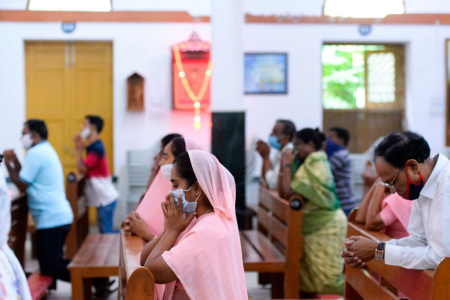India: Christians celebrate first Indian Christian Day, feast of St. Thomas

As it was Apostle Thomas who brought the Gospel to India and was martyred near the southern city of Chennai in 72 AD, Christians from all major denominations in the country celebrated July 3, the day he was killed, as the first Indian Christian Day amid rising persecution which is premised on the propaganda that Christianity is a foreign religion.
In India, July 3 was thus far observed as Saint Thomas Day to celebrate Saint Thomas who came to India in 52 AD with the message of Jesus. From this year onwards, it will also be celebrated as Indian Christian Day, according to Asia News.
“It’s a grassroots initiative, it is non-political and seeks no political patronage,” Fr. Cedric Prakash, a Gujarat-based priest and social activist, wrote in a letter addressed to all churches in the country prior to the day’s observance, The Quint reported.
“In recent years, there has been increased misinformation about the historicity of the message of Jesus in India; besides from certain quarters there are efforts to discredit the Christians with falsehoods and half-truths,” Prakash added.
“By marking it in 2021 and every year henceforth, we, as followers of the Lord Jesus, can preserve our identity within India’s cultural heritage, while uniting with all those who wish to celebrate it, irrespective of language, custom, creed, region or religion,” the promoters of the event said.
Christians are estimated to make up about 2.3% of India’s population.
Attacks on Christians have been on the rise since the Hindu nationalist Bharatiya Janata Party won the 2014 national elections.
“Since the current ruling party (Bharatiya Janata Party) took power in 2014, incidents against Christians have increased, and Hindu radicals often attack Christians with little to no consequences,” noted Open Doors’ World Watch List last year, which ranked India as the 10th worst country for Christians.
“The view of the Hindu nationalists is that to be Indian is to be Hindu, so any other faith — including Christianity — is viewed as non-Indian. Also, converts to Christianity from Hindu backgrounds or tribal religions are often extremely persecuted by their family members and communities,” Open Doors said at the time.
Several Indian states have “anti-conversion” laws, which presume that Christian workers “force” or give financial benefits to Hindus to convert them to Christianity.
While these laws have been in place for decades in some states, no Christian has been convicted of “forcibly” converting anyone to Christianity. These laws, however, allow Hindu nationalist groups to make false charges against Christians and launch attacks on them under the pretext of the alleged forced conversion.
Some of these laws state that no one is allowed to use the “threat” of “divine displeasure,” meaning Christians cannot talk about Heaven or Hell, as that would be seen as “forcing” someone to convert. And if snacks or meals are served to Hindus after an evangelistic meeting, that could be seen as “inducement.”
A recent report from Human Rights Watch warned that "prejudices embedded in the government" of the BJP led by Prime Minister Narendra Modi have “infiltrated independent institutions,” such as the police and the courts, “empowering nationalist groups to threaten, harass and attack religious minorities with impunity.”





















